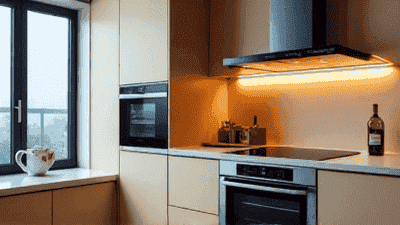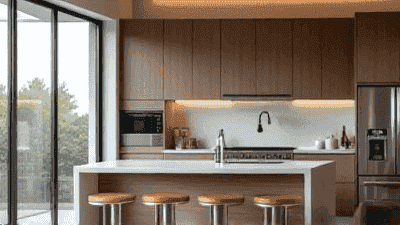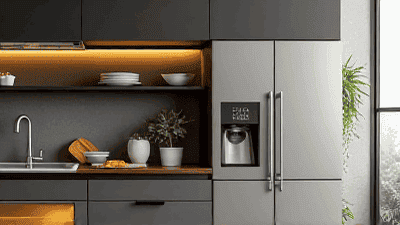
The kitchen is often referred to as the heart of the home—a place where meals are prepared, families gather, and memories are made. However, it can also be a space where inefficiencies lead to wasted time, energy, and resources. Enter smart appliances, the latest innovation in home technology designed to make your kitchen more efficient, convenient, and sustainable. By integrating smart appliances into your kitchen, you can streamline tasks, reduce energy consumption, and create a more enjoyable cooking experience.
Smart kitchen appliances are equipped with advanced features that allow them to connect to your home network and be controlled remotely via smartphones, tablets, or voice assistants. These devices offer a range of benefits that can transform your kitchen into a modern, efficient space. Here are some reasons to consider making the switch:
Convenience: Smart appliances simplify everyday tasks by automating processes and offering remote control options. For example, you can preheat your oven on your way home or check the contents of your fridge while grocery shopping.
Energy Efficiency: Many smart appliances are designed to optimize energy usage, reducing your utility bills and environmental impact.
Time Savings: Features like voice commands and automated cooking settings can help you prepare meals faster and more efficiently.
Enhanced Safety: Smart appliances often include safety features like alerts for overheating, leaks, or malfunctions, giving you peace of mind.
Integration with Other Smart Devices: Smart kitchen appliances can work together with other smart home devices, such as lighting and thermostats, to create a cohesive and efficient home ecosystem.

To help you get started on your smart kitchen journey, here are some of the top appliances to consider integrating into your space:
A smart refrigerator is more than just a place to store your groceries. These devices come with features like built-in cameras, touchscreens, and Wi-Fi connectivity, allowing you to:
Popular models include the Samsung Family Hub and the LG InstaView ThinQ.
Smart ovens offer advanced cooking features that make meal preparation easier and more precise. Key features include:
Top options include the June Oven and the Bosch 800 Series Smart Wall Oven.
Smart dishwashers optimize water and energy usage while offering convenience features like:
Popular choices include the Bosch 800 Series Smart Dishwasher and the KitchenAid Smart Stainless Steel Dishwasher.
For coffee lovers, a smart coffee maker can revolutionize your morning routine. These devices allow you to:
Check out the Behmor Connected Coffee Maker and the Smarter Coffee 2.0.
Smart cooktops and ranges combine precision cooking with advanced technology. Features include:
Popular models include the GE Profile Smart Induction Cooktop and the Café Smart Induction Range.
To maximize the efficiency of your smart kitchen appliances, it’s essential to integrate them into a cohesive smart home ecosystem. Here’s how to do it:
When selecting smart appliances, ensure they are compatible with your existing smart home system, such as Amazon Alexa, Google Assistant, or Apple HomeKit. This allows you to control multiple devices with a single app or voice assistant.
A smart home hub, such as the Samsung SmartThings Hub or the Google Nest Hub, can serve as the central control point for your kitchen devices. This allows you to monitor and control all your appliances from one place.
Most smart home systems allow you to create routines that automate tasks involving multiple devices. For example, you can set up a “Good Morning” routine that starts your coffee maker, preheats the oven, and turns on the kitchen lights.
Voice assistants like Amazon Alexa and Google Assistant make it easy to control your smart kitchen appliances hands-free. For instance, you can say, “Alexa, preheat the oven to 350 degrees,” or “Hey Google, start the dishwasher.”
Many smart appliances come with energy monitoring features that allow you to track their energy consumption. Use this data to adjust settings and reduce your overall energy usage.

To get the most out of your smart kitchen appliances, follow these tips:
Take the time to explore the settings and features of each appliance. Customize them to suit your cooking habits and preferences for maximum efficiency.
Many smart appliances allow you to schedule tasks like dishwashing or laundry during off-peak hours when energy rates are lower. This can help you save on utility bills.
Take advantage of sensors and notifications to stay informed about the status of your appliances. For example, set up alerts to notify you when the dishwasher cycle is complete or when the fridge door is left open.
Manufacturers often release firmware updates to improve performance and add new features. Ensure your smart appliances are running the latest software for optimal functionality.
Integrate smart lighting into your kitchen to complement your appliances. For example, use motion-activated lights or sync them with your cooking routines to create a seamless and efficient environment.
As technology continues to evolve, new trends are emerging in the world of smart kitchens. Here are a few to keep an eye on:
AI-powered devices, like the Thermomix TM6, are becoming increasingly popular. These appliances use artificial intelligence to guide you through recipes, adjust cooking settings automatically, and even suggest meal ideas based on the ingredients you have.
Smart faucets, such as the Delta Touch20, allow you to control water flow and temperature with voice commands or a simple tap. These devices help conserve water and simplify tasks like filling pots or washing hands.
Smart kitchen scales, like the Escali SmartConnect, sync with apps to provide precise measurements and nutritional information. They’re perfect for portion control and following recipes accurately.
Some companies are developing smart pantries that track inventory, suggest recipes based on available ingredients, and even automatically reorder groceries. These systems streamline meal planning and reduce food waste.
Manufacturers are focusing on creating appliances that consume less energy and water without sacrificing performance. Look for ENERGY STAR-certified devices that meet strict efficiency standards.

While smart kitchen appliances offer numerous benefits, there are some challenges to be aware of:
Smart appliances tend to be more expensive than traditional models. However, the long-term savings in energy and time can offset the initial investment.
Integrating and using smart appliances may require a learning curve, especially for those unfamiliar with technology. Start with one or two devices and gradually expand your smart kitchen setup.
Not all smart appliances are compatible with every smart home system. Research compatibility before purchasing to avoid frustration.
As with any connected device, smart appliances collect data that could pose privacy risks. Review the privacy policies of your devices and use strong passwords to protect your network.
Integrating smart appliances into your kitchen is a transformative step toward creating a more efficient, convenient, and enjoyable space. These devices simplify everyday tasks, reduce energy consumption, and enhance your cooking experience. By carefully selecting compatible appliances, setting up a smart home ecosystem, and optimizing their features, you can unlock the full potential of your smart kitchen. Stay updated on emerging trends and technologies to ensure your kitchen remains at the forefront of innovation. Embrace the future of home cooking and discover how smart appliances can make your kitchen the heart of a smarter home.